Welcome to IMMUNOLOGY 2013™
AAI Annual Meeting
Celebrating the AAI Centennial!
The Scientific Program at IMMUNOLOGY 2013™ featured cutting-edge developments from scientists at every career stage, including world leaders in immunology presenting their research in plenary lectures and special symposia, award lecture presentations, and major symposia. In addition, more than 700 other AAI and guest society members presented their latest findings in over 100 sessions. And over 2,050 poster presenters displayed and discussed their findings throughout the week.
Program By Day | Meeting Abstracts
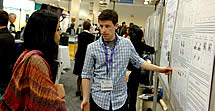
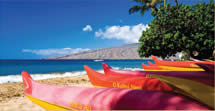
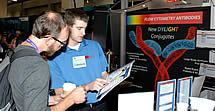
 President's Program (President's Address; President's Symposium)
President's Program (President's Address; President's Symposium)
AAI President's Address and Presentation of Lifetime Achievement Award
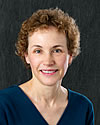
Friday, May 3, 6:00 PM, Kālakaua Ballroom AB
Gail A. Bishop, University of Iowa, AAI President
The many faces of TRAF molecules in immune regulation
Jeffrey A. Frelinger, University of Arizona
Introduction
AAI President's Symposium
Sunday, May 5, 2013, 3:00 PM - 5:00 PM, Kālakaua Ballroom AB
Immunoregulatory activity in the TNF family
Tania H. Watts, University of Toronto
The TNFR family member GITR: striking a chord in anti-viral immunity
Carl F. Ware, Sanford-Burnham Medical Research Institute
Bending LIGHT and cytokines
Linda C. Burkly, Biogen Idec, Inc.
The TWEAK/Fn14 pathway: a story from bedside and bench -- to bedside
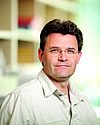
Michael Croft
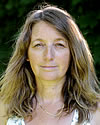
Tania H. Watts
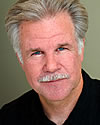
Carl F. Ware
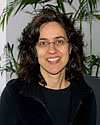
Linda C. Burkly
 Distinguished Lectures
Distinguished Lectures
Saturday, May 4, 5:15 PM - 6:00 PM, Kālakaua Ballroom AB
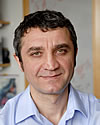
Ruslan Medzhitov
HHMI, Yale School of Medicine
Inflammation in health and disease
Sunday, May 5, 5:15 PM - 6:00 PM, Kālakaua Ballroom AB
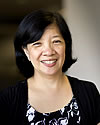
Jenny P.-Y. Ting
University of North Carolina at Chapel Hill
The broad impact of NLRs on immunity and beyond
Monday, May 6, 3:15 - 4:00 PM, Kālakaua Ballroom AB
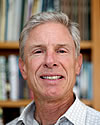
Stephen M. Hedrick
University of California, San Diego
The unique habitat of human beings and how this impacts our understanding of persistent infections, epidemics, and the evolution of memory
 Special Centennial Symposium
Special Centennial Symposium
A Legacy of Excellence
Leo Lefrançois, University of Connecticut Health Center
where sh(c)ould we go next?
Roger M. Perlmutter, Merck Research Laboratories, Building better medicines: immunology research and biopharmaceuticals
David Baltimore, California Institute of Technology, Viruses and immunity: the tension of desire
Anthony S. Fauci, NIAID, NIH, Three decades of HIV/AIDS science and policy: a personal journey
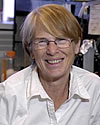
Philippa Marrack
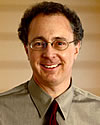
Roger M. Perlmutter
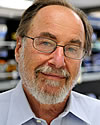
David Baltimore
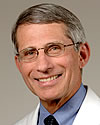
Anthony S. Fauci
 Major Symposia
Major Symposia
Saturday, May 4, 2013, 8:00 AM - 11:30 AM
Major Symposium A: Tissue-Resident Lymphocytes
Kālakaua Ballroom BWendy L. Havran, Scripps Research Institute
Wendy L. Havran, Scripps Research Institute, Crosstalk between epidermal-resident γδ T cells and epithelial cells
Adrian C. Hayday, King's College London and London Research Institute of Cancer Research UK, Beneficial autoimmunity: the responses and regulation of intraepithelial T cells
Leo Lefrançois, University of Connecticut Health Center, Cooperation between TCRαβ and TCRγδ T cells provides protective intestinal immunity
David Masopust, University of Minnesota, Resident memory CD8 T cell function in mucosal tissues
Hilde Cheroutre, La Jolla Institute for Allergy & Immunology, CD4 CTL: a major new player in health and disease
Major Symposium B: Antigen Receptor Signaling: Triggering Eruptions on Quiescent Cell Surfaces
Kālakaua Ballroom AArthur Weiss, HHMI, University of California, San Francisco
Facundo Batista, Cancer Research UK London Research Institute, Dynamic imaging of lymphocyte activation: from single molecule to living tissue
Louis M. Staudt, NCI, NIH, Pathological B cell receptor signaling in lymphoid malignancies
Arup K. Chakraborty, Massachusetts Institute of Technology, Early events in TCR signaling at the membrane
Takashi Saito, RIKEN Research Center for Allergy and Immunology, Yokohama, Japan, Dynamic regulation and modulation of T cell activation
Arthur Weiss, HHMI, University of California, San Francisco, Regulating tyrosine phosphorylation pathways controlled by antigen receptors
Sunday, May 5, 2013, 8:00 AM - 11:30 AM
Major Symposium C: CD4 T Cell Commitment and Plasticity: Fundamental Processes and Translational Applications
Kālakaua Ballroom BAnuradha Ray, University of Pittsburgh School of Medicine
John J. O'Shea, NIAMS, NIH, Transcriptional and epigenetic control of helper cell specification
K. Mark Ansel, University of California, San Francisco, MicroRNA regulation of helper T cell responses
Shimon Sakaguchi, Immunology Frontier Research Center, Osaka University, Epigenetics and plasticity of regulatory T cells
Megan K. Levings, University of British Columbia, CD4 T cell plasticity in health and chronic skin disease
Anuradha Ray, University of Pittsburgh School of Medicine, Challenges to Treg commitment influencing disease susceptibility
Major Symposium D: Innate Immune Surveillance of Cellular Stress and Injury
Kālakaua Ballroom AJulie Magarian Blander, Mount Sinai School of Medicine
Kenneth L. Rock, University of Massachusetts Medical School, Inflammasome-dependent and independent pathways of sterile inflammation
Guido Kroemer, University of Paris Descartes, Paris, Immunogenic cell death and its perception by innate immune effectors
Tiffany Horng, Harvard School of Public Health, Mitochondria, stress responses, and inflammation
Kodi S. Ravichandran, University of Virginia, Metabolic connections during apoptotic cell clearance
Kevin J. Tracey, Feinstein Institute for Medical Research, Neural arcs that control HMGB1, sterile inflammation, and innate immunity
Thirumala-Devi Kanneganti, St. Jude Children's Research Hospital, Mediators of inflammatory responses
Monday, May 6, 2013, 8:00 AM - 11:30 AM
Major Symposium E: The Battle Within: Viral and Intracellular Bacterial Pathogenesis
Kālakaua Ballroom BDenise M. Monack, Stanford University
Mary O'Riordan, University of Michigan Medical School, Dealing with stress: mobilization of antimicrobial defenses through engagement of ER stress circuitry
Gregory M. Barton, University of California, Berkeley, Microbes and innate immunity
Bruce D. Walker, Ragon Institute of MGH, MIT, and Harvard, T cell control of HIV
Sara Cherry, University of Pennsylvania, Perelman School of Medicine, Using RNAi screening to identify cell-intrinsic innate immune pathways
Herbert W. Virgin, Washington University School of Medicine, The virome in health and disease
Major Symposium F: Therapy of Human Autoimmune and Inflammatory Diseases: Emerging Concepts
Kālakaua Ballroom AAnne Davidson, Feinstein Institute for Medical Research
Anne Davidson, Feinstein Institute for Medical Research, The predictive value of SLE animal models: the story of belimumab
Brian L. Kotzin, Amgen, Inc., Development of new therapeutics for inflammatory diseases
Jeffrey A. Bluestone, University of California, San Francisco, Bringing Tregs to the clinic in autoimmunity and transplantation
Tamiko R. Katsumoto, University of California, San Francisco, The tyrosine phosphatase CD148 reveals a role for Src family kinases in asthma and pulmonary fibrosis
Judy H. Cho, Yale University, Do patterns of genetic associations predict therapeutic responses across immune-mediated diseases?
Andrew C. Chan, Genentech, Inc., Personalizing medicine to meet the challenges of drug discovery and development
Tuesday, May 7, 2013, 8:30 AM - 12:00 PM
Major Symposium G: Understanding Interactions Between the Immune System and Cancer: the Road to Immunotherapy
Kālakaua Ballroom BOlivera J. Finn, University of Pittsburgh School of Medicine
José R. Conejo-Garcia, Wistar Institute, Polymorphisms in pattern recognition receptors modulate antitumor immunity and alter malignant progression
David G. DeNardo, Washington University School of Medicine, Targeting tumor infiltrating macrophages decreases pancreatic tumor initiating cells and improves chemotherapeutic response
Randolph J. Noelle, Geisel School of Medicine at Dartmouth and King's College London, Liberating the immune system by interrupting VISTA function
Ronald Levy, Stanford Medical School, Monoclonal antibodies for the treatment of cancer: targeting the tumor and the immune system
Crystal L. Mackall, NCI, NIH, Emerging immunotherapies for pediatric cancer
Olivera J. Finn, University of Pittsburgh School of Medicine, Immunosurveillance and immunoprevention of non-viral cancers
Major Symposium H: TGF-β: Master Regulator of Immunity
Kālakaua Ballroom AElina Zuniga, University of California, San Diego
Adam Lacy-Hulbert, Massachusetts General Hospital / Harvard Medical School, Regulation of TGF-β activation by DCs in immunity
Michael J. Bevan, HHMI, University of Washington, Controlling T cell responses against self
Alexander Y. Rudensky, HHMI, Memorial Sloan-Kettering Cancer Center, Regulatory T cells and TGF-β
Paula M. Oliver, University of Pennsylvania, Ubiquitin regulation of iTreg differentiation
Elina Zuniga, University of California, San Diego, Immune regulation during chronic viral infection
 Award Lectures & Presentations
Award Lectures & Presentations
Annually recognizing immunologists of extraordinary professional achievement and promise, the AAI Career Awards include:
- AAI Lifetime Achievement Award
- AAI Distinguished Service Award
- AAI Excellence in Mentoring Award
- AAI-Life Technologies Meritorious Career Award
- AAI-Steinman Award for Human Immunology Research
- AAI-BD Biosciences Investigator Award
AAI-Steinman Award for Human Immunology Research Presentation and Lecture
Award Recipient: Barton F. Haynes, M.D., Duke University School of Medicine
Barton F. Haynes, M.D., Duke University School of Medicine
The path to development of an HIV-1 vaccine
AAI President Gail A. Bishop will introduce the awardee and present the award. Immediately following this short presentation, Dr. Haynes will deliver his lecture.
The AAI-Steinman Award for Human Immunology Research recognizes an individual who has made significant contributions to the understanding of immune processes underlying human disease pathogenesis, prevention, or therapy.
AAI-BD Biosciences Investigator Award Presentation and Lecture
Saturday, May 4, 4:00 PM – 5:00 PM, Kālakaua Ballroom C
Award Recipient: David Artis, Ph.D., University of Pennsylvania, Perelman School of Medicine
David Artis, Ph.D., University of Pennsylvania, Perelman School of Medicine
Regulation of innate and adaptive immunity at barrier surfaces
AAI President Gail A. Bishop and BD Biosciences Vice President of Biological Sciences Robert Balderas will introduce the awardee and present the award immediately prior to Dr. Artis's lecture.
The AAI-BD Biosciences Investigator Award recognizes an early-career investigator who has made outstanding contributions to the field of immunology.
AAI Excellence in Mentoring Award Presentation
Award Recipient: Suzanne Ostrand-Rosenberg, Ph.D., University of Maryland, Baltimore County
Suzanne Ostrand-Rosenberg, Ph.D., University of Maryland, Baltimore County
AAI President Gail A. Bishop and Pratima Sinha, University of Maryland, Baltimore County, will introduce the awardee and present the award.
The AAI Excellence in Mentoring Award recognizes exemplary career contributions to a future generation of scientists. The award will be presented prior to the start of Saturday's Distinguished Lecture.
AAI Lifetime Achievement Award Presentation
Award Recipient: Katherine L. Knight, Ph.D., Loyola University Chicago, Stritch School of Medicine
Katherine L. Knight, Ph.D., Loyola University Chicago, Stritch School of Medicine
AAI President Gail A. Bishop will introduce the awardee and present the award.
The AAI Lifetime Achievement Award is the highest honor bestowed by the AAI Council upon an AAI member. This award recognizes a deserving member for a career of scientific achievement and for contributions to AAI and fellow immunologists. The award will be presented prior to the start of the AAI President's Address.
AAI-Life Technologies Meritorious Career Award Presentation and Distinguished Lecture
Sunday, May 5, 5:15 PM – 6:00 PM, Kālakaua Ballroom AB
Award Recipient: Jenny P-Y. Ting, Ph.D., University of North Carolina at Chapel Hill
Jenny P-Y. Ting, Ph.D., University of North Carolina at Chapel Hill
The broad impact of NLRs on immunity and beyond
AAI President Gail A. Bishop and a representative of Life Technolo gies Corporation will introduce the awardee and present the award immediately prior to Dr. Ting's lecture.
The AAI-Life Technologies Meritorious Career Award recognizes a mid-career scientist for outstanding research contributions to the field of immunology.
AAI Distinguished Service Award Presentations
 Prosper N. Boyaka, Ph.D., The Ohio State University
Prosper N. Boyaka, Ph.D., The Ohio State University
For outstanding service to AAI and the immunology community as member and Chair of the AAI Minority Affairs Committee, 2006–2012
 Derry C. Roopenian, Ph.D., The Jackson Laboratory
Derry C. Roopenian, Ph.D., The Jackson Laboratory
For outstanding service to AAI and the immunology community as member and Chair of the AAI Committee on Public Affairs, 2005–2012
In addition to Career Awards, AAI annually provides more than 500 AAI meeting travel awards and grants to recognize the promise and bolster the professional development of early- and mid-career investigators, including underrepresented minority scientists and trainees.
- AAI Early Career Faculty Travel Grants
- AAI Minority Scientist Travel Awards
- AAI Trainee Abstract Awards
- AAI Trainee Poster Awards
- AAI-Life Technologies Trainee Achievement Awards
- Chambers-eBioscience Memorial Award
- Lustgarten-eBioscience Memorial Award
- Pfizer-Showell Travel Award
- AAI Laboratory Travel Grants
- AAI Undergraduate Faculty Travel Grants
For information on all AAI Awards, visit www.aai.org/Awards.
 AAI Committee Symposia & Sessions
AAI Committee Symposia & Sessions
AAI Clinical Immunology Committee Symposium
Saturday, May 4, 3:15 PM – 5:15 PM, Room 315
Anna Karolina Palucka, Baylor Institute for Immunology Research and Mount Sinai School
of Medicine
Anna Karolina Palucka, Baylor Institute for Immunology Research and Mount Sinai School of Medicine, Reprogramming the immune system via dendritic cells
Lawrence Steinman, Stanford University, Antigen-specific therapy for autoimmune disease: experience in humans
Marsha Wills-Karp, Johns Hopkins Bloomberg School of Public Health, Use of biologics in the treatment of asthma
Thomas A. Waldmann, NCI, NIH, The roles of IL-2 and IL-15 in the life and death of lymphocytes: implications for immunotherapy
A major goal of immunology research is to develop new strategies to prevent and treat disease. This session will focus on advances in immunotherapy with relevance to infectious, autoimmune, neoplastic and allergic disease.
AAI Committee on Public Affairs
Saturday, May 4, 1:00 PM – 2:30 PM, Room 314
Joe Palca, Science Correspondent, NPR, Will you listen to me if I pay you $1,000?
Olivera (Olja) J. Finn, University of Pittsburgh, Do scientists misunderstand the public? Rules of engagement
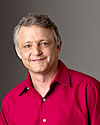
Joe Palca
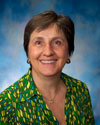
Olja Finn
As scientists, we conduct research not simply for the thrill of discovery, but in the fervent hope that our findings will one day improve human and/or animal health. But our work - and the entire scientific enterprise - depend on the federal funding that flows from taxpayer dollars. And many taxpayers do not understand what we do – while others doubt fundamental scientific theories. We must communicate better what we do, what it means, and why it matters to the public. In this session, NPR science correspondent Joe Palca and former AAI president Olja Finn will share their views on, and experiences with, communicating science, and discuss the challenges of bringing important scientific information to lay audiences. Attendees will have the opportunity to ask questions.
AAI Education Committee
Saturday, May 4, 6:30 PM – 8:00 PM, Room 323
Michael P. Crowley, Director, Business Development, Genentech, Inc.
Jonathan A. Deane, Research Investigator II, Genomics Institute of the Novartis Research Foundation
Joanne L. Viney, Vice President, Immunology Research, Biogen Idec
Many opportunities exist in industry for a scientist with advanced degrees. There are positions in laboratory research, program management, business development, regulatory affairs and clinical trials oversight, medical liaison, and more. This panel features scientists employed in a variety of positions in industry to share their career paths and highlight the skills required to succeed in these careers. Following the panel discussion, enjoy casual conversation with the speakers and other industry connections at a networking reception.
AAI Education Committee & AAI Committee on the Status of Women
Sunday, May 5, 1:00 PM – 2:00 PM, Room 323
on the Status of Women
Registration Fee: $20 (Lunch included.)
At this always popular session, you'll have opportunity to meet with scientists at your own career stage and with more experienced scientists to explore specific career issues important to men and women in science today. Learn what others are thinking and gain insights into issues you are confronting in your own situation. Choose from topics related to the environment you work in (academic research, biotech industry, governmental agencies), the transitions from specific career stages, or issues in balancing career and family in any career path. Don't miss this great networking opportunity!
Discussion topics and table leaders:
- Research Careers in Academia
- Graduate Student to Postdoc: finding a postdoc, interviewing
Table Leaders: Michele M. Kosiewicz, University of Louisville: Michelle A. Parent, University of Delaware; Christina L. Nance, Baylor College of Medicine - Postdoc to PI: finding a position, interviewing, negotiating, lab start-up
Table Leaders: Carolina B. Lopez, University of Pennsylvania School of Veterinary Medicine; Shabaana A. Khader, Children's Hospital of Pittsburgh, UPMC - New PI: attracting students and postdocs, preparing for tenure
Table Leader: Nilabh Shastri, University of California Berkeley - So I won't get tenure: now what?
Table Leader: Virginia Shapiro, Mayo Clinic - Undergraduate Institutions: finding the balance in teaching, doing research
Table Leaders: James E. Riggs, Rider University; Devavani Chatterjea, Macalaster College
- Graduate Student to Postdoc: finding a postdoc, interviewing
- Mentoring Effectively
Table Leaders: Janice S. Blum, Indiana University School of Medicine; Dorina Avram, Albany Medical College - Networking Skills
Table Leader: Donna L. Farber, Columbia University Medical Center - Career and Family: time management, family leave, professional couples
Table Leaders: Scheherazade Sadegh-Nasseri, Johns Hopkins Medical Institute; Susan Kovats, Oklahoma Medical Research Foundation - Careers in Biotech and Industry: moving from academia to industry and vice versa;
Table Leader: Mary E. Keir, Genentech; Joanne L. Viney, Biogen Idec; Kerry A. Casey, MedImmune; Peggy Just, eBioscience; Theresa Schaub, eBioscience - Careers at Governmental Agencies (FDA/NIH/USDA/CDC)
Table Leaders: Carol H. Pontzer, NCCAM, NIH; A. Andrew Hurwitz, NCI, NIH - Non-research Careers: focus for 2013, science writing
Table Leaders: Jamie D.K. Wilson, Nature Immunology; Kaylene J. Kenyon, The Journal of Immunology - The Physician Scientist: balancing clinical and research duties
Table Leader: Marcus R. Clark, University of Chicago
AAI Minority Affairs Committee
Saturday, May 4, 1:00 PM – 2:30 PM, Room 323 C
Registration Fee: $20 (Lunch included.)
Don't miss this opportunity to meet one-on-one with accomplished, senior minority immunologists to hear how they have handled the career challenges you now face. Learn what they believe will work for you today.
Table discussion topics:
- Grad Student: finding a mentor; taking aim at postdoc training
Table Leaders: Gregory B. Carey, University of Maryland, Baltimore; Santiago Partida-Sanchez, Nationwide Children's Hospital - Postdoc: finding a mentor; taking aim at a faculty position
Table Leaders: Jose Conejo-Garcia, The Wistar Institute; Jose A. Guevara-Patino, Loyola University; Margaret S. Bynoe, Cornell University - Junior Faculty: preparing for promotion and tenure
Table Leaders: Adriana T. Larregina, University of Pittsburgh; Esteban Celis, Moffitt Cancer Center, University of South Florida - Academia or Industry: how to decide (or switch sides)
Table Leaders: Jonathan A. Deane, GNF/Novartis - Government Agency Careers: CDC, FDA, NIH
Table Leaders: Cherie L. Butts, Biogen Idec - Non-Research Careers: science journalism, patent law, biomedical entrepreneurship
Table Leaders: John Emrich, AAI
Monday, May 6, 2:00 PM – 3:00 PM, Room 318 B
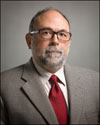 Esteban Celis, Moffitt Cancer Center, University of
Esteban Celis, Moffitt Cancer Center, University of South Florida
The long road to effective peptide vaccines for cancer:
learning from infectious diseases and autoimmunity
AAI Publications Committee
Saturday, May 4, 1:00 PM – 3:00 PM, Room 317
Jane H. Buckner, Benaroya Research Institute at Virginia Mason, Genetic variants associated with autoimmunity result in altered B cell homeostasis and function
Hirohito Kita, Mayo Clinic Rochester, Innate type 2 lymphoid cells in immunity and allergic airway inflammation
Emily Corse, MD Anderson Cancer Center, Expression of Helios in peripherally induced Foxp3+ regulatory T cells
This symposium will features speakers whose work, published in The Journal of Immunology in 2012, was selected by the editors as outstanding reports of general interest to the immunology community.
The authors will give a brief overview of the published results and then bring the audience up-to-date on research carried out on these topics since the articles appeared.
AAI Veterinary Immunology Committee & American Association of Veterinary Immunologists (AAVI) Joint Symposium
Monday, May 6, 1:00 PM – 3:00 PM, Room 317
Susan D. Eicher, Livestock Behavior Research Unit, ARS, USDA
Guido Silvestri, Yerkes National Primate Research Center, Emory University School of Medicine, Understanding AIDS by studying natural SIV infections
Daniel R. Perez, University of Maryland, College Park, Of men, pigs, birds, and...flu
Carol Reinero, University of Missouri College of Veterinary Medicine, What spontaneous and experimental feline asthma can teach us about human asthma
Traditional rodent models often do not recapitulate human disease, and performing research directly in humans presents its own set of practical limitations and ethical concerns. Research in nonhuman primates and domestic animal species fills this void and has provided major advances in our understanding of diseases of both humans and animals. This symposium will illustrate the value of a range of natural animal models of human infectious and immunologic diseases.
 NIH Institute-Sponsored Symposia
NIH Institute-Sponsored Symposia
National Institute of Allergy and Infectious Diseases (NIAID) Symposium: Current Progress: Development and Maintenance of Long-Lived Plasma Cells
Michael G. McHeyzer-Williams, Scripps Research Institute
Michael G. McHeyzer-Williams, Scripps Research Institute, Programming effective plasma cell responses
David M. Allman, University of Pennsylvania, Role of short-lived bone marrow plasma cells in long-lived immunity
Jan Erikson, Wistar Institute, Plasma cell induction following respiratory tract infection
Discussion with all participants, Discussion of gaps in understanding plasma cell biology
National Institute on Aging (NIA) Symposium: Aging, Cancer and Immunosenescence
Graham Pawelec, University of Tübingen
Judith Campisi, Buck Institute for Research on Aging, Inflammation caused by senescent cells: A link between age-related cancer and degeneration?
Tyler J. Curiel, University of Texas Health Science Center, San Antonio, Tailoring age-optimized cancer immunotherapy: early insights
Marcel R.M. van den Brink, Memorial Sloan-Kettering Cancer Center and Weill Medical College of Cornell University, Strategies to reverse thymic involution
National Institute of Environmental Health Sciences (NIEHS) Symposium: Impact of Environmental Exposures on Immune Function
Prakash Nagarkatti, University of South Carolina at Columbia
Nancy I. Kerkvliet, Oregon State University, TCDD: An environmental toxicant reveals novel pathways of immune regulation
Mitzi Nagarkatti, University of South Carolina at Columbia, The role of microRNA and epigenetic regulation of T cell dysfunction following prenatal exposure to DES
Stephen B. Pruett, Mississippi State University, Mechanisms of immunotoxicity of sodium methyldithiocarbamate: Unexpected observations on the role of oxidative stress in inflammation and innate immunity
 Guest Society Symposia
Guest Society Symposia
American Association of Veterinary Immunologists (AAVI) and AAI Veterinary Immunology Committee Joint Symposium: Natural Animal Models of Human Disease
Susan D. Eicher, Livestock Behavior Research Unit, ARS, USDA
Guido Silvestri, Yerkes National Primate Research Center, Emory University School of Medicine, Understanding AIDS by studying natural SIV infections
Daniel R. Perez, University of Maryland, College Park, Of men, pigs, birds, and...flu
Carol Reinero, University of Missouri College of Veterinary Medicine, What spontaneous and experimental feline asthma can teach us about human asthma
American Society of Transplantation (AST) Symposium: Achieving and Detecting Tolerance in Transplant Patients
Maria-Luisa Alegre, University of Chicago
Sandy Feng, University of California, San Francisco, Withdrawal of immunosuppression from the operationally tolerant patient
Joseph R. Leventhal, Northwestern University, Inducing tolerance in mismatched kidney transplant recipients
Kenneth A. Newell, Emory University School of Medicine, Identifying tolerance signatures in kidney transplant recipients
Australasian Society for Immunology (ASI) Symposium: Lymphocyte Differentiation Following Immunization
John Stambas, Deakin University
Kim L. Good-Jacobson, Walter & Eliza Hall Institute, c-Myb is required for plasma cell migration to the bone marrow during an immune response
Jonathan M. Coquet, Flanders Institute, Ghent, The CD27 and CD70 costimulatory pathway inhibits effector function of Th17 cells and attenuates associated autoimmunity
Susan Johnson, University of Geneva, Functionally 'exhausted' CD8+ T cell populations help resolve chronic viral infection
Stephanie Gras, Monash University, Structural basis of viral escape in influenza
Canadian Society for Immunology (CSI) Symposium: Cytokine Regulation of Immunity
Nathalie Labrecque, Université de Montréal
Valérie Abadie, Sainte-Justine Hospital Research Centre, Impact of IL-15 dysregulation on celiac disease pathogenesis
Georgia Perona-Wright, University of British Columbia, Cytokine versus receptor in the control of cytokine signaling
Christopher J. Paige, Ontario Cancer Institute, IL-12 conducts an anti-cancer quartet
Nathalie Labrecque, Université de Montréal, Circadian regulation of cytokine production by T cells
Chinese Society of Immunology (ChSI) Symposium: Molecular Regulation of Innate Response and Inflammation
Olivera J. Finn, University of Pittsburgh School of Medicine
Zhengfan Jiang, Peking University, Regulation of virus-induced innate immunity
Youcun Qian, Institute of Health Sciences, Chinese Academy of Sciences, and Shanghai Jiaotong University School of Medicine, IL-17 family cytokines and inflammation
Wenwei Tu, University of Hong Kong, Gammadelta T cells: unpolished sword in human antiviral immunity
Jiyan Zhang, Chinese Academy of Military Medical Sciences, RACK1 in cytokine production and inflammation
German Society for Immunology (DGfI) Symposium: Innate Lymphocytes in Health and Disease
Andreas Radbruch, Rheumatism Research Center (DRFZ), Berlin
Andreas Diefenbach, University of Freiburg, Transcriptional control of innate lymphocyte fate decision
Barbara Rehermann, NIDDK, NIH, Natural killer cells in hepatitis C virus infection
Immo Prinz, Medical University Hannover, Immune regulation by interleukin-17-producing γδ T cells
Dieter Kabelitz, University of Kiel, Plasticity of human Vγ9Vδ2 T cells
International Cytokine and Interferon Society (ICIS) Symposium: Interferons and Innate Immunity
Bryan R.G. Williams, Monash Institute of Medical Research
Meredith O'Keeffe, Burnet Institute, The role of IFN-λ in dendritic cell activation
Iain L. Campbell, University of Sydney, Type I IFN signaling in the host response to virus infection
Hilario Ramos, University of Washington, The convergence of IL-1 and type I IFN signaling in antiviral immunity
Bryan R.G. Williams, Monash Institute of Medical Research, Regulation of IFN and cytokine signaling and action of PLZF
Dane Parker, Columbia University Medical Center, Type I IFNs and Staphylococcus aureus
Laurel L. Lenz, National Jewish Health and University of Colorado Denver, Regulation of myeloid cell responsiveness to IFN-γ by type I IFNs
Japanese Society for Immunology (JSI) Symposium: Molecular Basis of Chronic Inflammation
Toshinori Nakayama, Chiba University
Akira Shibuya, University of Tsukuba, Inhibitory immunoreceptors in inflammatory diseases
Kiyoshi Takeda, Osaka University, Regulation of gut homeostasis by innate immunity
Toshinori Nakayama, Chiba University, Generation and maintenance of pathogenic memory CD4 T cells
Korean Association of Immunologists (KAI) Symposium: Regulatory Mechanism of Immune Homeostasis
Eun Sook Hwang, Ewha Womans University
Eun-Kyeong Jo, Chungnam National University School of Medicine, Autophagy and innate immunity in mycobacterial infection
Chang-Duk Jun, Gwangju Institute of Science and Technology (GIST), IGSF4/CADM1 regulates both T cell activation and homing
Eun Sook Hwang, Ewha Womans University, Crucial roles of Lysine 313 of T-box in T-bet
Sin-Hyeog Im, Gwangju Institute of Science and Technology (GIST), Role of NFAT1 transcription factor in experimental myasthenia gravis
Mexican Society for Immunology (MSI) Symposium: Development of Novel Adjuvants and Immunomodulators
Security Institute
Arturo Reyes-Sandoval, University of Oxford
Gladys Fragoso, National Autonomous University of Mexico, The cysticeri-derived peptide GK1 is able to modulate the immune response: considerations of its adjuvant properties for vaccine development
Ignacio Terrazas, National Autonomous University of Mexico, Regulation of inflammatory diseases by cestode antigens: multiple receptors and a possible common pathway
Mayra Pérez, National School of Biological Sciences, National Polytechnic Institute, Present and future of immunomodulatory peptides obtained from dialyzable leukocyte extracts
Constantino López-Macías, National Medical Centre "Siglo XXI", Mexican Social Security Institute, Use of Salmonella porins as novel adjuvants for vaccine development
Society for Glycobiology (SFG) Symposium: Glycan Recognition in Regulation of Innate and Adaptive Immunity
Gabriel A. Rabinovich, Institute of Biology and Experimental Medicine (IBYME-CONICET), Regulatory circuits in autoimmunity and cancer mediated by galectin-glycan interactions
Yvette van Kooyk, Vrije Universiteit Medical Center Amsterdam, Glycans for improving skin vaccination strategies
Matthew S. Macauley, Scripps Research Institute, Siglec-induced B cell tolerance and therapeutic potential
Jeffrey V. Ravetch, Rockefeller University, The role of glycans in antibody activity
Society for Immunotherapy of Cancer (SITC) Symposium: Cancer Immunotherapy 2013: Overcoming Barriers to Adaptive Immunity
Robert D. Schreiber, Washington University School of Medicine, Cancer immunoediting: antigens, mechanisms, and therapeutic implications
Philip D. Greenberg, University of Washington, Creating high avidity T cells for targeting tumors
Thomas F. Gajewski, University of Chicago, Innate and adaptive immune regulation within the tumor microenvironment
Yang-Xin Fu, University of Chicago, Targeting tumor tissues for improving immune responses by next generation of antibody treatment
Julie R. Brahmer, Johns Hopkins University School of Medicine, PD-1/PD-L1 axis
Society of Mucosal Immunology (SMI) Symposium: Innate Immunity at Mucosal Surfaces
Monday, May 6, 1:00 PM – 3:00 PM, Room 316 A
Joanne Viney, Biogen Idec
Hiroshi Ohno, RIKEN Research Center for Allergy and Immunology, Function and differentiation of M cells, a unique subset of intestinal epithelial cells specialized for mucosal antigen uptake
Charles L. Bevins, University of California, Davis, Strategies of defensin-mediated innate immunity in the small intestine
Society for Natural Immunity (SNI) Symposium: Natural Killer Cells: Evolution, Development, Differentiation, Function, and Clinical Use
Sarah Cooley, University of Minnesota
Ashley Moffett, University of Cambridge, Natural killer cells and the outcome of human pregnancy
Karl-Johan Malmberg, Karolinska Institute, Human KIR repertoire diversity and its adaptation to viral infection
Sarah Cooley, University of Minnesota, Therapeutic applications of NK cells
The Obesity Society (TOS) Symposium: Immunometabolism: The Role of the Immune System in Obesity and Type 2 Diabetes
Gerald V. Denis, Boston University School of Medicine
Alyssa Hasty, Vanderbilt University, Function of resident macrophages in adipose tissue homeostasis
Barbara S. Nikolajczyk, Boston University School of Medicine, Lymphocyte functions in type 2 diabetes
Gerald V. Denis, Boston University School of Medicine, Unresolved, chronic inflammation as a critical link between insulin-resistant obesity and the obesity-associated cancers
Bonnie B. Blomberg, University of Miami Miller School of Medicine, Biomarkers for human B cell responsiveness to influenza vaccine in elderly and type 2 diabetics
 Career Development Sessions
Career Development Sessions
Through workshops, roundtables, and one-on-one counseling, IMMUNOLOGY 2013™ provides critical career development programs.
Career sessions and services this year include:
- Careers in Biotech: Panel Discussion and Networking
- Careers in Science Networking Roundtables (2)
- How to Convert Your CV into a Resumé (followed by one-on-one counseling)
- Interviewing for a Job
- Secrets for a Successful Postdoctoral Fellowship
AAI is also offering an online and onsite Jobs Board free to meeting registrants and exhibitors.
New Member Breakfast
Saturday, May 4, 6:45 AM – 7:25 AM
AAI wishes to welcome new Regular and Trainee members joining AAI for the first time. AAI President Gail Bishop and other AAI leaders look forward to meeting you personally. Please join us with your invitation in hand for light refreshments and casual conversation. Event by invitation only.
How to Convert Your CV into a Resumé
For anyone seeking a job outside of academe, how you present yourself on paper is critical. A well prepared resumé can make all the difference in securing that interview. The focus of this session will be on the important elements of a resumé, the differences between a resumé and the standard academic curriculum vitae, and the information needed to make a good impression. In this special career development session, attendees will be instructed in how to transform their CVs into professional resumés.
Small breakout sessions for individual consulting will follow from 1 PM to 3 PM. Bring your CV!
Careers and Networking Roundtable
Saturday, May 4, 1:00 PM – 2:30 PM, Room 323 C
Registration Fee: $20 (Lunch included.)
Don't miss this opportunity to meet one-on-one with accomplished, senior minority immunologists to hear how they have handled the career challenges you now face. Learn what they believe will work for you today.
Table discussion topics:
- Grad Student: finding a mentor; taking aim at postdoc training
Table Leaders: Gregory B. Carey, University of Maryland, Baltimore; Santiago Partida-Sanchez, Nationwide Children's Hospital - Postdoc: finding a mentor; taking aim at a faculty position
Table Leaders: Jose Conejo-Garcia, The Wistar Institute; Jose A. Guevara-Patino, Loyola University; Margaret S. Bynoe, Cornell University - Junior Faculty: preparing for promotion and tenure
Table Leaders: Adriana T. Larregina, University of Pittsburgh; Esteban Celis, Moffitt Cancer Center, University of South Florida - Academia or Industry: how to decide (or switch sides)
Table Leaders: Cherie L. Butts, Biogen Idec; Jonathan A. Deane, GNF/Novartis - Government Agency Careers: CDC, FDA, NIH
Table Leaders: TBA - Non-Research Careers: science journalism, patent law, biomedical entrepreneurship
Table Leaders: John Emrich, AAI
Careers in Biotech: Panel Discussion and Networking
Saturday, May 4, 6:30 PM – 8:00 PM, Room 323
Michael P. Crowley, Director, Business Development, Genentech, Inc.
Jonathan A. Deane, Research Investigator II, Genomics Institute of the Novartis Research Foundation
Joanne L. Viney, Vice President, Immunology Research, Biogen Idec
Many opportunities exist in industry for a scientist with advanced degrees. There are positions in laboratory research, program management, business development, regulatory affairs and clinical trials oversight, medical liaison, and more. This panel features scientists employed in a variety of positions in industry to share their career paths and highlight the skills required to succeed in these careers. Following the panel discussion, enjoy casual conversation with the speakers and other industry connections at a networking reception.
Interviewing for a Job
This session will be focused on tips and techniques to help you successfully navigate the interview process. Emphasis will be on how you can present yourself in the best possible light. You will also learn how to respond to unexpected questions. This session is open to anyone but is especially intended for student and postdoctoral attendees.
Secrets for a Successful Postdoctoral Fellowship
University of California, San Francisco
A postdoctoral fellowship is the time to develop research skills you will need to succeed as an independent scientist. It is, however, just as important to realize that you need to prepare for a career path at the same time. This session will highlight ways of getting the most out of your postdoctoral fellowship, relating successfully with your mentor, and understanding how to use the resources available to you to ensure that your training prepares you adequately for a seamless transition into the next phase of your career.
Careers in Science Roundtable
Sunday, May 5, 1:00 PM – 2:00 PM, Room 323
on the Status of Women
Registration Fee: $20 (Lunch included.)
At this always popular session, you'll have opportunity to meet with scientists at your own career stage and with more experienced scientists to explore specific career issues important to men and women in science today. Learn what others are thinking and gain insights into issues you are confronting in your own situation. Choose from topics related to the environment you work in (academic research, biotech industry, governmental agencies), the transitions from specific career stages, or issues in balancing career and family in any career path. Don't miss this great networking opportunity!
Discussion topics and table leaders:
- Research Careers in Academia
- Graduate Student to Postdoc: finding a postdoc, interviewing
Table Leaders: Michele M. Kosiewicz, University of Louisville: Michelle A. Parent, University of Delaware; Christina L. Nance, Baylor College of Medicine - Postdoc to PI: finding a position, interviewing, negotiating, lab start-up
Table Leaders: Carolina B. Lopez, University of Pennsylvania School of Veterinary Medicine; Shabaana A. Khader, Children's Hospital of Pittsburgh, UPMC - New PI: attracting students and postdocs, preparing for tenure
Table Leader: Nilabh Shastri, University of California Berkeley - So I won't get tenure: now what?
Table Leader: Virginia Shapiro, Mayo Clinic - Undergraduate Institutions: finding the balance in teaching, doing research
Table Leaders: James E. Riggs, Rider University; Devavani Chatterjea, Macalaster College
- Graduate Student to Postdoc: finding a postdoc, interviewing
- Mentoring Effectively
Table Leaders: Janice S. Blum, Indiana University School of Medicine; Dorina Avram, Albany Medical College - Networking Skills
Table Leader: Donna L. Farber, Columbia University Medical Center - Career and Family: time management, family leave, professional couples
Table Leaders: Scheherazade Sadegh-Nasseri, Johns Hopkins Medical Institute; Susan Kovats, Oklahoma Medical Research Foundation - Careers in Biotech and Industry: moving from academia to industry and vice versa;
Table Leader: Mary E. Keir, Genentech; Joanne L. Viney, Biogen Idec; Kerry A. Casey, MedImmune; Peggy Just, eBioscience; Theresa Schaub, eBioscience - Careers at Governmental Agencies (FDA/NIH/USDA/CDC)
Table Leaders: Carol H. Pontzer, NCCAM, NIH; A. Andrew Hurwitz, NCI, NIH - Non-research Careers: focus for 2013, science writing
Table Leaders: Jamie D.K. Wilson, Nature Immunology; Kaylene J. Kenyon, The Journal of Immunology - The Physician Scientist: balancing clinical and research duties
Table Leader: Marcus R. Clark, University of Chicago
 AAI Business Meeting & Awards Presentations
AAI Business Meeting & Awards Presentations
Monday, May 6, 1:00 PM – 2:30 PM, Room 316 B
This session will include the annual report to AAI members on AAI and The Journal of Immunology business affairs and will feature special 2013 AAI award presentations and acknowledgments. Refreshments will be provided.
Presentations and acknowledgments will include:
- AAI Distinguished Service Awards
- AAI-Life Technologies Trainee Achievement Awards
- Chambers-eBioscience Memorial Award
- Lustgarten-eBioscience Memorial Award
- Pfizer-Showell Travel Award
- AAI Early Career Faculty Travel Grants
- AAI Undergraduate Faculty Travel Grants
- AAI Laboratory Travel Grants
- AAI Minority Scientist Travel Awards
- AAI Trainee Abstract Awards
- AAI Trainee Poster Awards
 Block Symposia & Poster Sessions
Block Symposia & Poster Sessions
Block Symposia - Selected abstracts are programmed into oral sessions called Block Symposia. Each Block Symposium is made up of approximately eight selected abstracts. Approximately 84 Block Symposia are programmed for this annual meeting.
View IMMUNOLOGY 2013™ Block Symposium Schedule
Poster Sessions - The most interactive part of the meeting! Discuss data and research issues firsthand with authors at the Poster Sessions. Posters will be displayed Saturday through Monday in the Hawaii Convention Center Kamehameha II & III Exhibit Halls from 9:30 AM to 3:30 PM.
- Dedicated Daily Poster Presentations from 11:45 AM to 1:00 PM!
- No concurrent symposia, presentations, or other sessions will be held during the poster presentations at this time.
- Accepted posters may be displayed for the duration of the meeting! Authors are encouraged to leave their posters up throughout IMMUNOLOGY 2013™.
 Social Events
Social Events
IMMUNOLOGY 2013™ Opening Night Welcome Reception
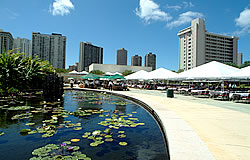 Generously sponsored by eBioscience
Generously sponsored by eBioscience7:00 PM – 9:00 PM
Friday, May 3, 2013
Rooftop Garden
Hawaii Convention Center
The Opening Night Welcome Reception ignites the historic AAI Centennial Celebration! Come directly from the President's Address to the stunning Rooftop Garden of the Hawaiian Convention Center to reunite with friends, make new acquaintances, enjoy the spectacular beauty of Hawaii, and plan your week.
President's Service Appreciation Reception (By invitation only)
7:00 PM – 8:30 PM
Sunday, May 5, 2013
At this important event, AAI leadership honors the association's dedicated member volunteers–the committee members, editors, mentors, instructors, and others–who work on the membership's behalf throughout the year by giving generously of their time in support of the AAI mission. Open to 2012-2013 AAI volunteers.
IMMUNOLOGY 2013™ Gala
The AAI Centennial Celebration Luau
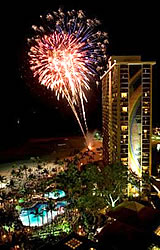 Generously sponsored by BioLegend
Generously sponsored by BioLegend6:30 PM – 9:00 PM
Monday, May 6, 2013
Hilton Hawaiian Village, Great Lawn
The IMMUNOLOGY 2013™ Gala will be an enchanting evening honoring the 100th anniversary of AAI. You'll revel in the splendor and soft breezes of the lagoon setting while feasting sumptuously on our Polynesian luau buffet. Your options during the evening can include learning how to make leis, weave palms, and, of course, hula. Festivities will also include the "Escape to Paradise" program, featuring vibrant Hawaiian singers and colorfully costumed dancers whose precision movements portray the proud history of the Hawaiian people. Capping this most memorable evening will be a magnificent display of fireworks across the evening sky. Meeting badge is required for attendees. Tickets are required for guests.
 Exhibit Hall & Exhibitor Workshops
Exhibit Hall & Exhibitor Workshops
Click here to view the list of Exhibitors at IMMUNOLOGY 2013™.
Exhibitor Workshops - Take advantage of the opportunity provided by the Exhibitor Workshops to explore exhibitors' latest technologies, products, and services.
Workshops are planned and conducted by exhibitors; the listing of these workshops does not constitute endorsement of any products or services by AAI.
Promotional Videos - Be sure to catch the promotional videos of exhibitors' new products. Videos will be run on video monitors located throughout the convention center.
Promotional videos are planned and created by exhibitors; the listing of these videos does not constitute endorsement of any products or services by AAI.
Exhibit Hall Passport Program - Fill out your Exhibit Hall Passport for a chance to win one of three $250 American Express gift cards! Entries must be received by Monday, May 6, at 11:00 AM! You'll find your Passport in your meeting bag or you may pick one up at the AAI Booth.
 HOME
HOME




 Collapse Program
Collapse Program